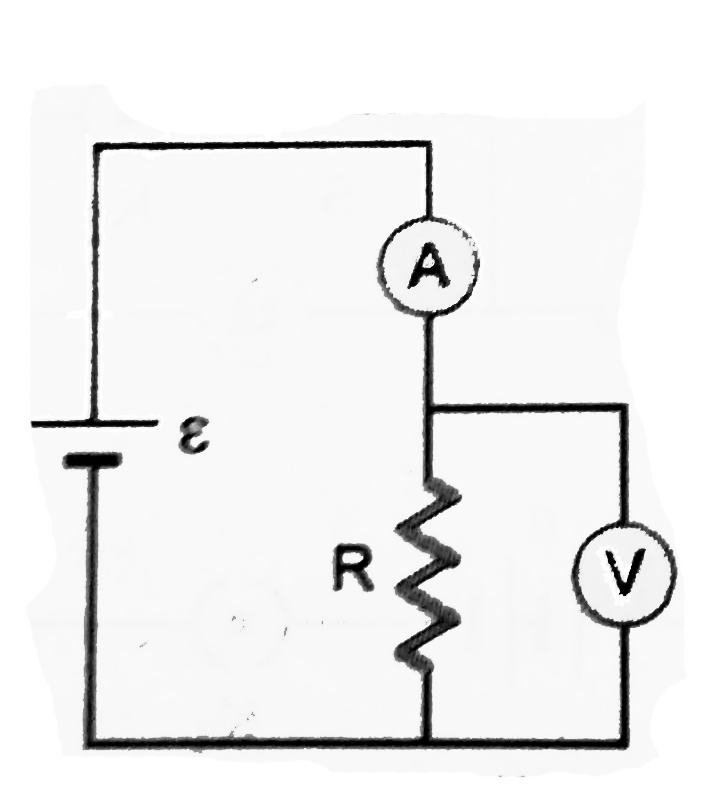The resistance R depends on
material of the conductor
dimension of conductor
Both (1)and(2)
Neither (1) nor (2)
The correct Answer is:C
To determine how the resistance R of a conductor depends on various factors, we can analyze the relationship using the formula for resistance. Here's a step-by-step solution:
Step 1: Understand the Formula for Resistance
The resistance R of a conductor is given by the formula:
R=ρLA
where:
- R is the resistance,
- ρ is the resistivity of the material,
- L is the length of the conductor,
- A is the cross-sectional area of the conductor.
Step 2: Identify the Factors Affecting Resistance
From the formula, we can see that the resistance R depends on three main factors:
1. Material of the Conductor: The resistivity ρ is a property that depends on the material used. Different materials have different resistivities. For example, copper has a low resistivity and is a good conductor, while rubber has a high resistivity and is an insulator.
2. Length of the Conductor: The resistance is directly proportional to the length L of the conductor. This means that if the length increases, the resistance also increases.
3. Cross-sectional Area of the Conductor: The resistance is inversely proportional to the area A of the conductor. This means that if the area increases, the resistance decreases.
Step 3: Conclusion
Based on the analysis, we conclude that the resistance R depends on:
- The material of the conductor (through resistivity ρ),
- The length of the conductor L,
- The cross-sectional area of the conductor A.
Thus, the correct answer is that the resistance R depends on both the material and the dimensions (length and area) of the conductor.
Final Answer
The resistance R depends on:
- The material of the conductor,
- The length of the conductor,
- The cross-sectional area of the conductor.
The resistance R of a conductor is given by the formula:
R=ρLA
where:
- R is the resistance,
- ρ is the resistivity of the material,
- L is the length of the conductor,
- A is the cross-sectional area of the conductor.
From the formula, we can see that the resistance R depends on three main factors:
1. Material of the Conductor: The resistivity ρ is a property that depends on the material used. Different materials have different resistivities. For example, copper has a low resistivity and is a good conductor, while rubber has a high resistivity and is an insulator.
2. Length of the Conductor: The resistance is directly proportional to the length L of the conductor. This means that if the length increases, the resistance also increases.
3. Cross-sectional Area of the Conductor: The resistance is inversely proportional to the area A of the conductor. This means that if the area increases, the resistance decreases.
Based on the analysis, we conclude that the resistance R depends on:
- The material of the conductor (through resistivity ρ),
- The length of the conductor L,
- The cross-sectional area of the conductor A.
The resistance R depends on:
- The material of the conductor,
- The length of the conductor,
- The cross-sectional area of the conductor.
Similar Questions
Knowledge Check
- Question 1 - Select One
The resistance depends on:
AOnly, materialBDimension of the conductorCBoth (a) and (b)DColour of wire - Question 2 - Select One
The resistance of a conductor depends on its
ALengthBarea of cross sectionCtemperatureDall of these - Question 3 - Select One
The resistance of a cell does not depend on
ACurrent drawn from the cellBTemperature of electrolyteCConcentration of electrolyteDThe e.m.f . of the cell
A voltmeter of resistance RV and an ammeter of resistance RA are connected in a circuit to measure a resistance R as shown in figure. The ratio of the meter readings gives an apparent resistance R′. Show that R and R′ are related by the relation
1R=1R′−1RV
 View Solution
View SolutionA power supply with an e.m.f ε and internal resustance r is connected to a variable resistance R. Find the dependence of the total power generated by the supply and of the power delivered to the external circuit on the load resistance.
View SolutionThe resistance of a conductor does NOT depend on which of the following factors?
View SolutionAmong the following the resistance does not depend upon:
View Solutionp (resistivity) depends on
View Solution
